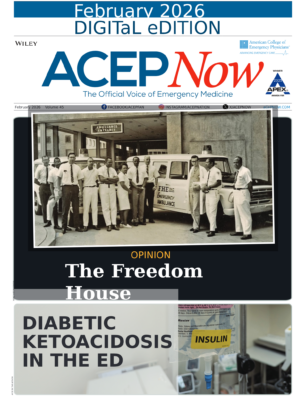With the nation’s health care reform law in place and no real expectation of its repeal, ACEP leaders discussed the College’s priorities for the law’s implementation process at a Town Hall session Sunday, Oct. 26, during the ACEP Council Meeting.
Explore This Issue
ACEP News: Vol 29 – No 11 – November 2010“This is probably the most significant moment in our careers. Our Washington office is already working on all of this, but the discussions will heat up after the November elections,” said ACEP President-elect Dr. Sandy Schneider. “We are all going to have to work together with one message. This is a time to build emergency medicine into a stronger emergency medicine.”
During the meeting, ACEP President Dr. Angela Gardner distributed a chart of the Patient Protection and Affordable Care Act of 2010 that matched provisions in the law with ACEP’s strategy. Some of the key priorities include the following:
- Extend the “prudent layperson standard” to grandfathered health plans to eliminate the need for prior authorization.
- Improve emergency department efficiencies.
- Improve the physicians’ quality reporting system.
- Recognize the important role emergency physicians play in providing the full continuum of care to Medicare beneficiaries.
- Raise concerns about new Medicare payment mechanisms, such as bundled payments.
- Distribute additional residency positions to emergency medicine residency programs.
- Highlight the education and training needs of emergency medicine as the work of the National Health Care Workforce Commission proceeds.
- Represent the emergency medicine perspective in identifying research priorities and establishing and implementing the research project agenda.
- Extend medical liability coverage and review the unique requirements of physicians who provide EMTALA related services.
- Consider how the Federal Tort Claims Act may be applied to ensure the availability of emergency and on-call physicians.
“We will have to be diligent” as the lengthy and complex regulatory process continues, said Gordon Wheeler, ACEP’s Associate Executive Director for Public Affairs. “There will likely be attempts to slow funding for the law’s implementation, attempts to undercut and undermine its intent.
“As imperfect as the law is, there are a lot of things we would like to see happen in there,” he said.
To bolster the efforts of ACEP’s Washington, DC, office, the ACEP Board of Directors on Saturday, Oct. 25, approved a budget modification to provide more health care reform resources, including hiring two new staff members and contracting with a legal firm that specializes in regulatory law.
Dr. Steve Stack, ACEP member and secretary of the AMA, said, “We need to focus on how we can work within this law. We are hopeful that there is not coverage without access. If all the uninsured [patients] have coverage, we know the ED patient volumes will go up and they are only going to get larger.”
Comments from members of the Council focused on concerns about emergency physician payments, projects that ultimately were cut from the reform package, and the tables at which ACEP needs a seat now to protect and promote the interests of emergency patients and emergency physicians.
“The tables I want to be at are small tables in someone’s office, the people who are actually writing the regulations,” said Dean Wilkerson, ACEP Executive Director.
Mr. Wilkerson also explained that emergency physicians can and should get involved in the process, as well, by staying informed and informing ACEP of crucial issues at the state and local levels, joining the 911 network or the spokespersons network, writing concise newspaper editorials, staying active in their chapters, and donating to NEMPAC.
Pages: 1 2 | Multi-Page





No Responses to “Health Care Reform Priorities Discussed at Town Hall”